- 18 Sep 2023
- 6 Minutes to read
- Print
- DarkLight
Release 2.3.0
- Updated on 18 Sep 2023
- 6 Minutes to read
- Print
- DarkLight
This document describes in detail the new features and enhancements introduced in Agile.Now Factory release 2.3.0. This release will be available for download from Outsystems Forge Agile.Now Factory. The general estimated availability is September 2023
- Streamlining issues and modules association
- List of assignees and filtering option
- Tracking module version deployments
- User setting
- Development environment probe
Streamlining issues and modules association
In the new release of Agile.Now Factory a bundle of new features are introduced aiming at enhancing the workflow for developers and tech leads, providing them with improved guidance to ensure consistent association of relevant modules with issues. The following sections describe these features in detail and the advantages they offer.
Compelling module association for issues
It is now possible to configure a behaviour at the project level that compels developers to associate relevant modules to an issue before they can start working on the issue. The rules apply to all issues in "To DO" and "In progress" status.
- Go to Projects - > Behaviour
- Set the toggle on for "Prevent deployment when there are issues without assigned modules"
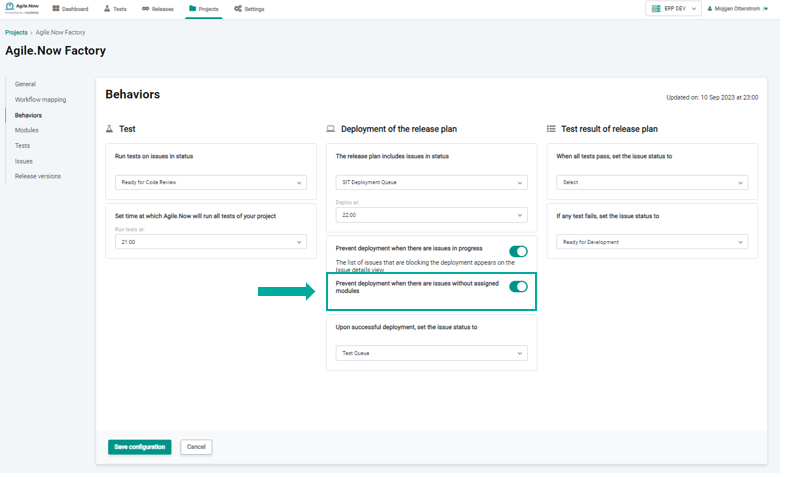 Project behaviour setting - Toggle for enforcing the rules for associating modules to issues
Project behaviour setting - Toggle for enforcing the rules for associating modules to issues
When opening the issue details page, a developer is prompted with a pop-up menu where they can select one or several relevant modules to associate with a specific issue.
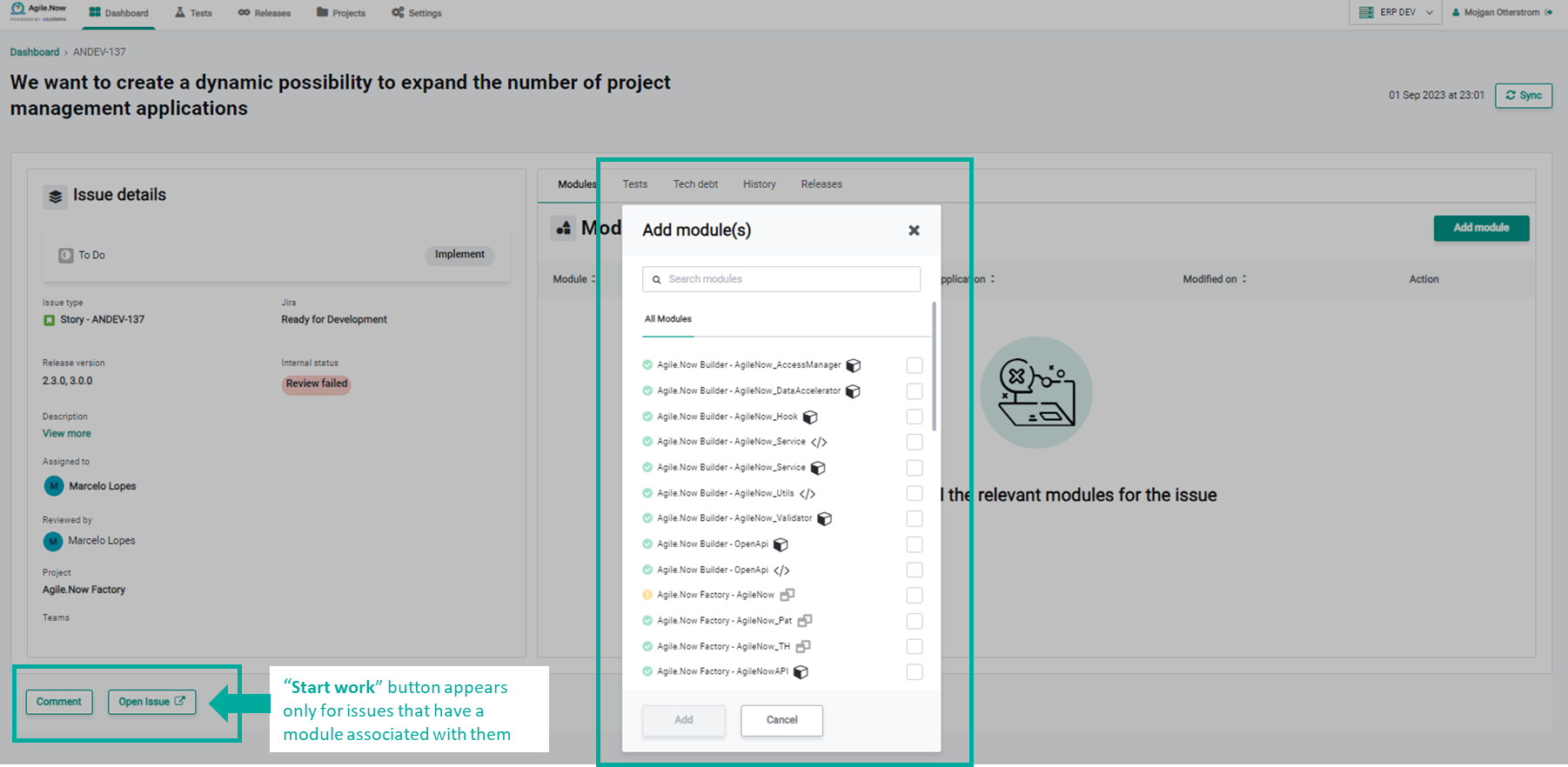 Pop-up menu - list of modified modules by the developer
Pop-up menu - list of modified modules by the developer
and list of all other modules
- The "Start work" action button is not visible when there are no associated modules with an issue
- If an issue is assigned to a different developer than the current user, the "start work" button is disabled. The user must change the assignee to the current user.
Benefits:
- To ensure developers understand which modules require changes to meet issue requirements
- Provide tech leads with visibility into changes modules for code review
- Simplify the process of identifying modules that need code review
- Streamline the deployment process by enforcing the association of issues with modules
Module change notification pop-up menu
The purpose of this feature is to simplify the workflow of linking modules with issues.
This feature triggers a pop-up notification menu on Agile.Now Factory developer Dashboard whenever a developer changes and publishes any application module in the Outsystems Service Centre without associating it with a ticket(issue), reminding them to link the modified module to a project issue.
- The pop-up notification menu does not appear when an issue linked to a module is already assigned to a user.
- The pop-up menu notification only appears in the development environment.
Benefits:
- All changes in the application are tracked and documented,
- Unit tests are linked to modules and related issues, ensuring that all changes in the application are thoroughly tested,
- Agile.Now Factory allows release managers, tech leads, or product managers to make informed decisions with confidence when deploying a release package, as they have visibility of the impact of all changes made in the application.
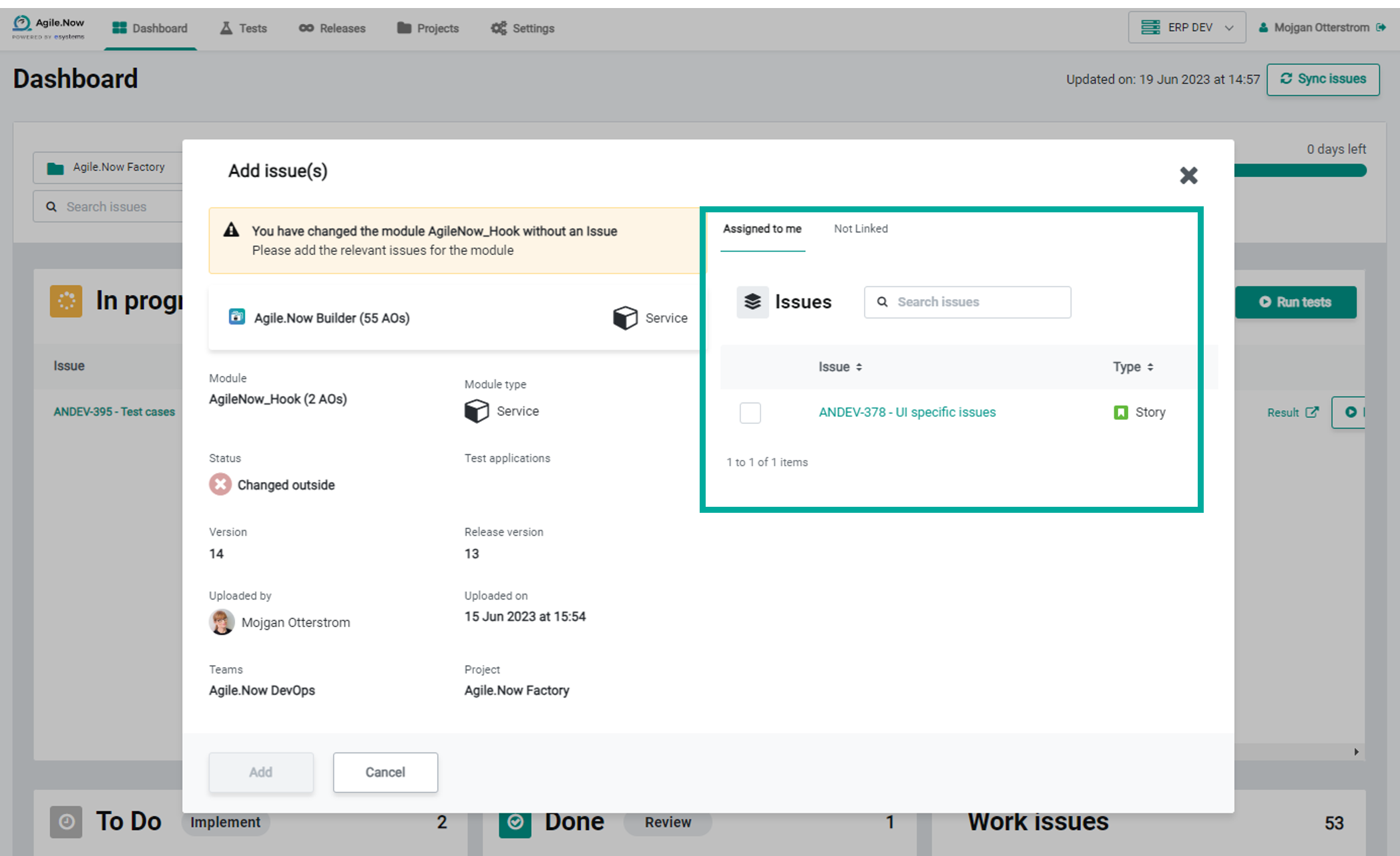 Pop-up menu to remind the developer to associate his/her module changes with an issue in the project pipeline The pop-up menu appears on the screen where the user can select the issues from the list that can be associated with the modified module:
Pop-up menu to remind the developer to associate his/her module changes with an issue in the project pipeline The pop-up menu appears on the screen where the user can select the issues from the list that can be associated with the modified module:
- The list of all issues in the "To Do" or "In progress" status that are assigned to the user
- The list of all other issues in the "To Do" or "In progress" status that are in the release version in progress.
Issue details - New "Release" tab
A new tab "Releases" is introduced on the Issue details page. This tab provides details about the specific source and destination environments for a particular issue's deployment. The status field indicates whether the deployment process from one environment to another was successful or encountered any failures.
 Issue details - insights on the issue's release across different environmentsBenefits:
Issue details - insights on the issue's release across different environmentsBenefits:
- Users can easily track which environments (Development, Test, or Production) have a specific issue deployed, hence enhancing the traceability of issue progress across different environments.
- Technical leads can quickly identify issues that were pushed back during the process, enabling them to address the root causes faster.
Technical debt information on Issue details and Module details
The OutSystems AI mentor, a quality analysis tool is now integrated into Agile.Now Factory. Developers can now get insights on technical debt analysis at module and Issue levels. Technical debt information is automatically synchronized with OutSystems AI mentor, allowing the user to view the last update date.
On the Issue detail page, a new tab "Tech debt" is introduced which provides quality information for modules associated with the issue.
Quality categories are colour-coded and classified as "Low", "Medium-Low", "Medium", "Medium-High" and "High". These categories can be used as quality indicators and the severity levels of technical debt, providing insights for the developers and tech leads on specific issues and modules that may require further code inspection and improvements.
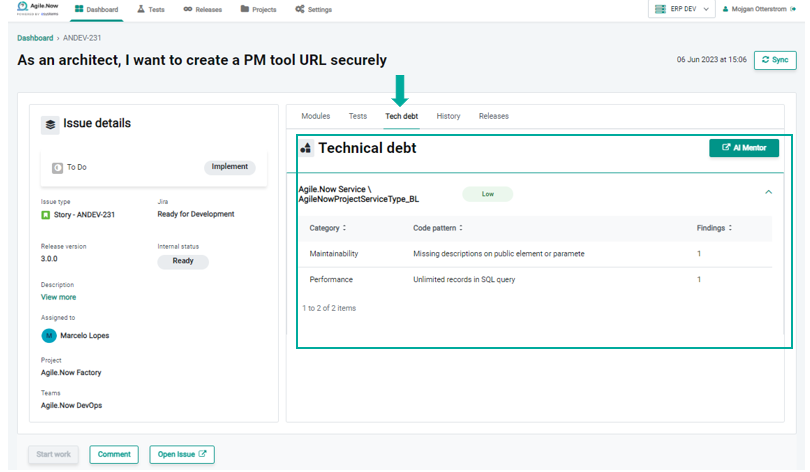 Tech debt tab on the Issues details page
Tech debt tab on the Issues details pageAn issue may be associated with one or multiple modules. The "Tech tab" provides insights into the technical dept level of each module separately.
On the Module details page, the "Tech debt" tab also provides insights about both the module itself and the application it belongs to. The developer can also directly redirect to the AI mentor tool for further detailed information.
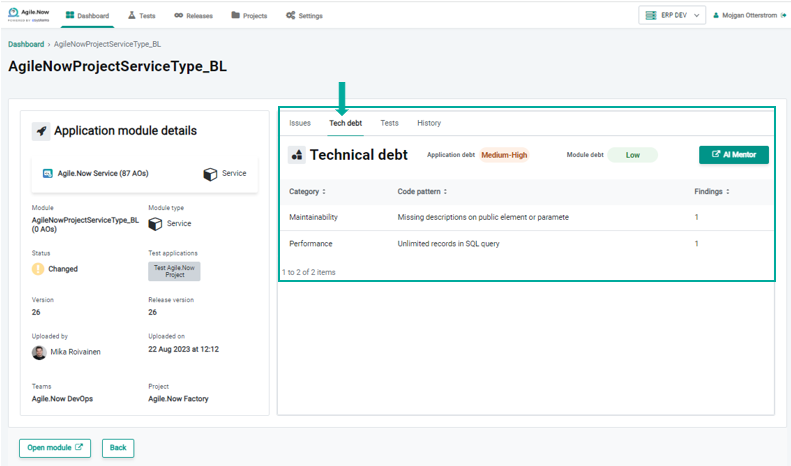 Tech debt tab on the Module details page
Tech debt tab on the Module details pageTech debt tab on the Issue detail and Module detail pages is only available in the Development environment.
Benefits:
Developers and tech leads can gain comprehensive insights into issues progress and the quality of the software changes through a single dashboard view. This eliminates the need to navigate between multiple systems, saving time and providing an efficient overview of issue status and module quality in one place.
OutSystems AI Mentor - connection setting
To enable the analysis of technical debt for the modules, the OutSystems AI mentor API key must be configured as follows:
- Go to the Settings -> Connected apps - >
- Select the OutSystems tab
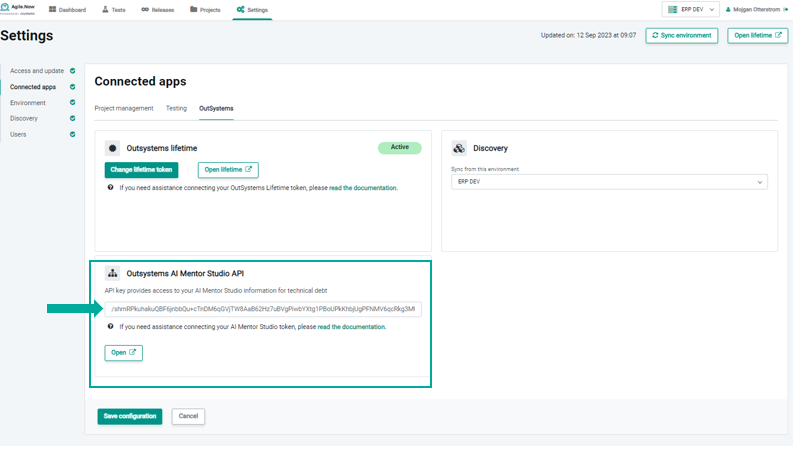 Settings: OutSystems AI mentor integration
Settings: OutSystems AI mentor integration
List of assignees and filtering option
In the new release, the list of assignees and their corresponding icons for project issues is displayed on the Dashboard. By selecting the user's icon, you can filter out the list of all other issues assigned.
Additionally, a new dropdown menu featuring all users is available for filtering the issues assigned to the selected one or multiple users.
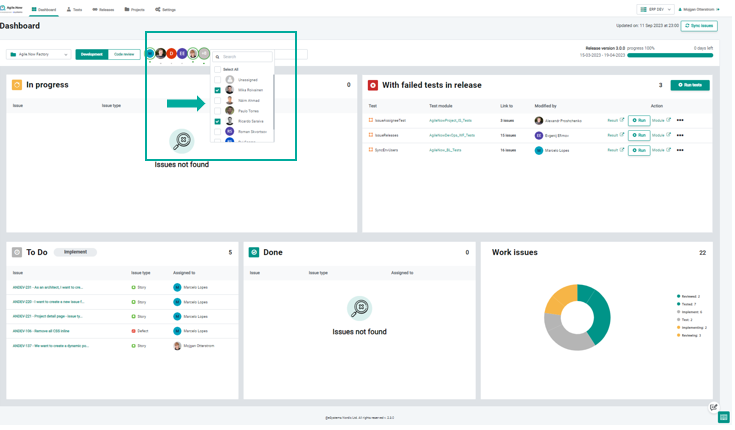 List of project assignees and their icons for filtering issues purposes
List of project assignees and their icons for filtering issues purposes- Effortlessly filter all the issues assigned to a user and view the status of their tasks.
Tracking module version deployments
In the previous release, we introduced the module version feature, allowing users to monitor the base module versions used in a project release and track the latest development version of a module.
With this new release, you can now track module versions deployed in each environment and product release. For instance, while development teams are actively working on the latest module version, and quality assurance teams are testing the latest deployed version in the testing environment, with the new feature, all teams have clear visibility into which module versions are deployed in each environment.
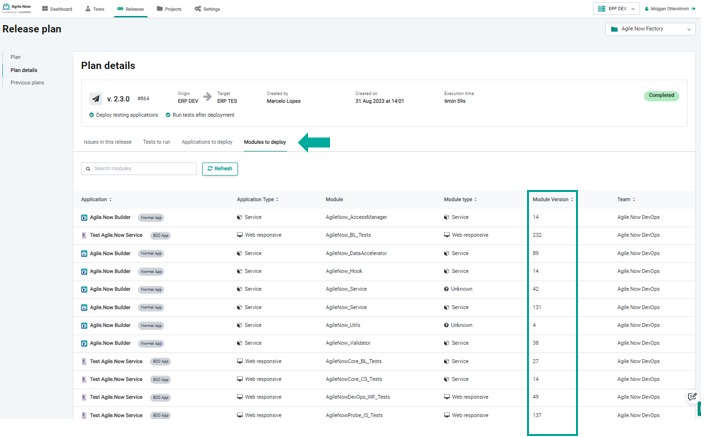 Release deployment detail plan provides insights on module versions deployed
Release deployment detail plan provides insights on module versions deployed Benefits:
- Precise traceability of which version of modules are included in each release helps in maintaining, troubleshooting, auditing, and ensuring that specific features or fixes in the module are included in a release
- Helping the Quality assurance team in tracking the right test plans are executed and the overall stability of the software release
- Transparency into what changes have been introduced in each release for assessing the impact of changes for for example coordinating migrations, rollouts or possible rollbacks
Tracking module versions in releases is a best practice in software development that enhances transparency, quality control, and overall management of the software products.
Users setting
While permission and role settings are inherited directly from OutSystems, there are situations where the swift assignment of Admin role is required for efficient management of Agile.Now Factory application. The new Users feature allows for quick administration and control of the admin user role without the need to navigate to the OutSystems lifetime permission setting.
 User's admin permission setting through the Users list
User's admin permission setting through the Users listDevelopment environment probe
This new feature has been introduced in Agile.Now Factory to eliminate the need for manually terminating and restarting a business process in the OutSystems Service Center when the development listener service becomes unresponsive.
- Go to Settings -> Access and update
- Update - > Development environment problem - > Restart Now
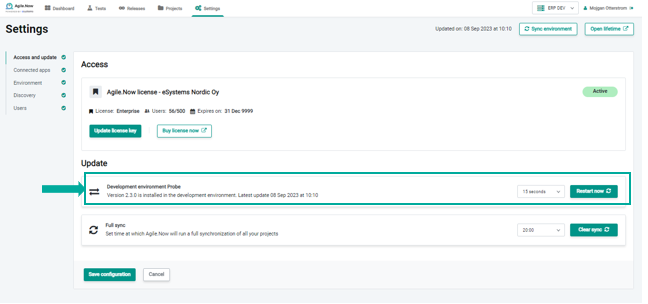 Restarting the development listeners service through Agile.Now Factory
Restarting the development listeners service through Agile.Now Factory


